
Tell us what you need to find a matching loft conversion specialist

Get free quotes from professionals near you

Compare offers and choose the one that best matches your need
- Householdquotes.co.uk
- Driveway
- Driveway Materials
- Block Paving Guide
Block Paving Driveway UK: The Complete 2024 Guide

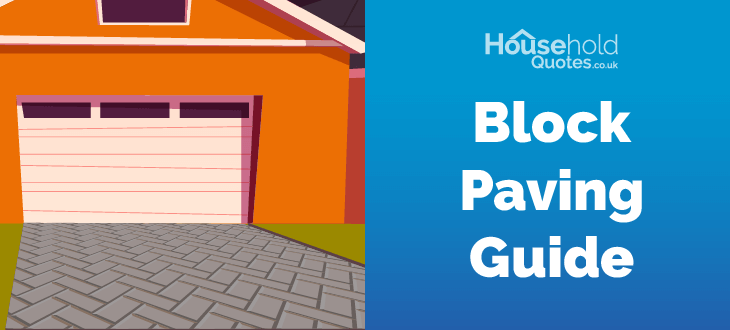
- The most common block pavers are concrete and clay brick pavers, with stone, composite, and permeable block pavers also available.
- The average cost of a 20m2 block paving driveway is approximately £3,500.
- You can choose from three main types of block paving driveway designs: herringbone, basketweave, and a stretcher bond pattern.
- The average cost of block paving materials is around £100 per m2.
- Block pavers are a popular choice because they are durable, flexible, easy to repair, and offer versatile design options.
Block paving driveways are a sure fire way to improve homes by providing functionality and aesthetic appeal. Renowned for their durability, versatility, and extensive design options, they offer a robust solution that significantly enhances a property’s curb appeal.
This paving method can withstand heavy traffic and diverse weather conditions while providing ample opportunities for creative design through various patterns, colours, and textures.
This comprehensive guide will provide a complete overview of block paving driveways in the UK, covering their costs, benefits, installation process, and the best block pavers available.
While block driveways are an excellent choice, they are more expensive than traditional driveway materials. If you want to stay within your budget with driveway blocks, comparing multiple quotes from driveway specialists is crucial to getting the best deal.
However, we understand that this process can be time-consuming, and it's not always guaranteed that you will work with a trusted contractor. Household Quotes can offer you four free non-binding quotes from local trusted driveway specialists to save you time and money.
Fill out our 30-second form to obtain these quotes and get the best deals with the best driveway specialists.
- Describe your needs
- Get free quotes
- Choose the best offer
It only takes 30 seconds

Driveway blocks or bricks?
Two types of block paving are available: concrete block paving and brick clay pavers. Concrete pavers are a cost-effective option that comes in various colours and styles. On the other hand, clay pavers, while more expensive, are known for their durability and classic look. The term "block paving" is used interchangeably for both, so it's essential to understand their differences.
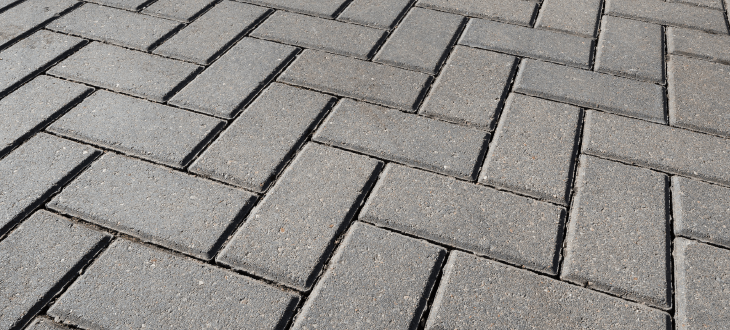
Concrete block pavers are made from cement, aggregates, and water. They are moulded and cured to form durable block paving for driveways. Due to the abundant raw materials and relatively simple manufacturing process, they are more affordable than other types of pavers, such as those made from clay or stone.
Furthermore, you can add concrete colouring to the concrete mixture, offering greater versatility and choice for your driveway. Their affordability and strength make them popular, creating a sleek, modern finish for your home.
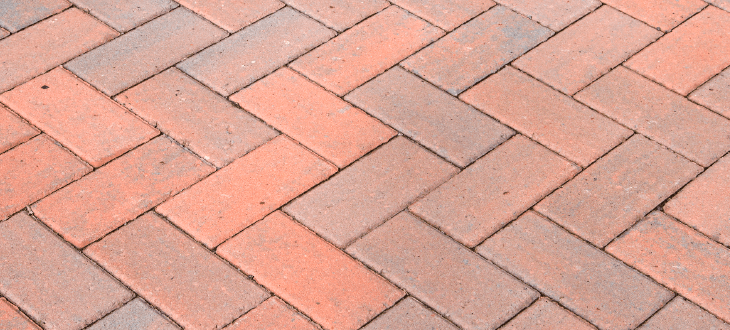
On the other hand, paving bricks are typically made from natural clay, which is moulded and kiln-fired to achieve a hard, dense structure. Known for their rich, earthy colours and classic aesthetics, clay bricks are often more expensive and have a timeless appeal.
Bricks tend to be more durable and resistant to fading than concrete pavers. Still, they can be more challenging to install due to their natural variations in size and shape.
Choosing between concrete block pavers and bricks depends on budget, desired look, and long-term performance. However, if you are looking for a long-lasting driveway that requires little maintenance and is affordable, concrete block paving driveways are the best choice.
What is driveway block paving?
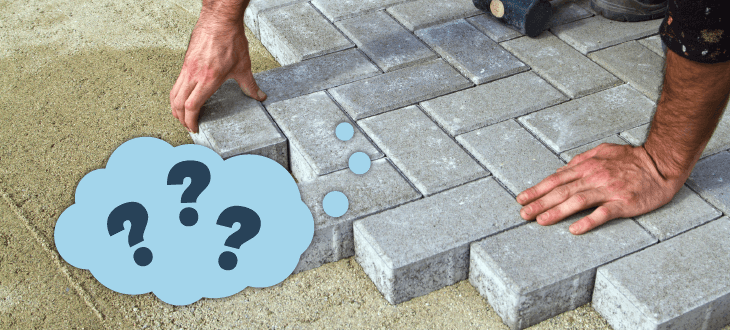
Block paving driveways involve constructing a driveway using individual blocks or bricks to create a durable surface. Removing and replacing these blocks is easy, simplifying repairs. This approach differs from gravel, tarmac, or poured concrete, which involve applying layers of material to create a solid surface.
While block paving driveways are more costly to install than other materials like gravel, tarmac, or poured concrete, they offer the advantage of more straightforward repairs. In contrast, cheaper driveway options like concrete or tarmac can be more challenging to repair. Pouring them onto the surface may necessitate replacing the entire driveway.
Block driveways allow you to install a unique design to your home's entryway. Block pavers offer various shapes and colors, allowing you to create interesting designs for your driveway.
While pavers are interchangeably used for clay, stone, and concrete, block paving refers to the use of concrete. According to Paving Expert, concrete is moulded into a standardised shape of 100mm x 200mm x 50-100mm, with precisely 50 blocks per square meter.
This means you can interchangeably use blocks from different suppliers, saving on the effort of sourcing the same block when one needs replacement. This differs from clay bricks, which offer a variety of shapes and sizes, such as cobbles, setts, and rectangles.
While this may be good for design purposes, the lack of uniformity in sizing means that if one brick gets damaged, you will need to find the exact same brick for repairs, which can increase the time and money spent on repairs. Stone is another material that falls under the category of pavers.
However, people typically use stone pavers on patios and outdoor areas rather than driveways. They are usually thinner and flatter than clay or concrete pavers and cannot withstand the weight of vehicular traffic.
When considering driveway paving, it's important to understand the differences between each type of paver material to ensure you choose the right one for your driveway. Concrete block paving driveways are popular due to their standard size, durability, and affordable cost.
Best choices for a block driveway in the UK
When considering the best driveway options for a concrete block driveway in the UK, it's crucial to focus on choices that combine durability, aesthetic versatility, and weather resilience. Here are the most common types:
1. Standard concrete pavers: These are the most basic types of block paving driveways and are known for their strength and versatility, making them suitable for various design patterns. Their simplicity and durability make them a popular choice.
2. Permeable concrete pavers: These block paving driveways address drainage issues and allow water to pass through the joints between the blocks, reducing surface runoff. This feature makes them an excellent choice for areas prone to flooding.
3. Interlocking concrete pavers: These pavers feature a unique shape that allows them to interlock, providing added stability and preventing shifting under heavy loads. This enhances the structural integrity of the block paving driveway, making it suitable for areas with frequent vehicular traffic.
4. Textured concrete pavers: Available in various finishes such as tumbled, shot-blasted, or polished, textured concrete pavers offer enhanced aesthetic appeal. Tumbled pavers provide a weathered, rustic look, while polished or shot-blasted finishes give a more contemporary, sophisticated appearance. You can choose these pavers to complement the architectural style of the property.
Choosing the correct type of concrete block depends on factors such as the desired aesthetic, the driveway's intended use, and local environmental conditions.
Proper installation and maintenance are crucial to maximising the lifespan and performance of any concrete block driveway.
Below, we provide some common types and designs of block paving driveways prevalent in the UK. This will give you some ideas on the style you would like.
Grey block paving driveway with border
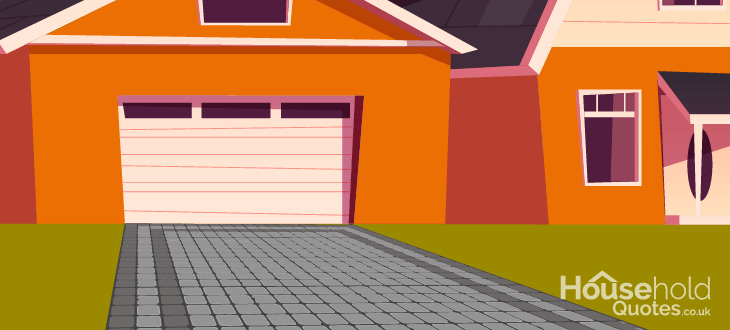
A grey block paving driveway with a border can significantly enhance the visual appeal of any property. The neutral grey blocks offer a sleek, contemporary look that complements various architectural styles, from modern to traditional homes.
Adding a contrasting border, perhaps in a darker or complementary shade, adds definition and structure to the design, creating a visually appealing framework that enhances the overall layout. This combination ensures durability and functionality, withstands heavy use and harsh weather, and requires relatively low maintenance.
The individual blocks can be easily replaced if damaged, and the permeability of the paving helps with efficient water drainage, reducing the risk of flooding. The cohesive yet striking appearance of a grey block paving driveway with a border can enhance curb appeal and increase the property's market value.
Charcoal block paving driveway
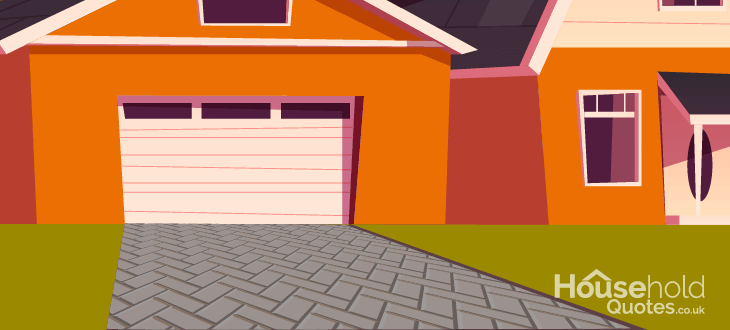
A charcoal block paving driveway has a sophisticated and modern aesthetic that can enhance the entrance of any property. The deep, rich tones of charcoal blocks create a sleek, contemporary look that complements various exterior colours and architectural styles.
This type of paving enhances visual appeal and offers exceptional durability and resilience against daily wear and tear and harsh weather conditions. The dark hue of charcoal paving helps conceal stains and tyre marks, making it a practical option for busy households.
Additionally, the robust nature of the blocks ensures they can handle heavy loads, making them ideal for driveways frequently used by cars and other vehicles. With easy maintenance and the option to replace individual blocks if needed, a charcoal block paving driveway combines style and functionality, significantly boosting the property's curb appeal and overall value.
Black block paving driveway
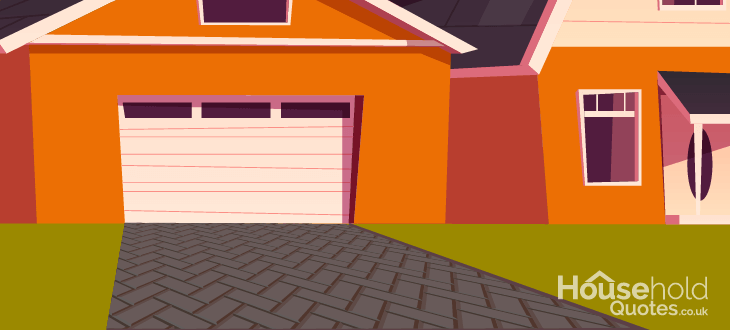
A black block paving driveway brings a bold and elegant touch to any property's exterior. The deep black colour creates a sophisticated, modern look that can dramatically enhance the curb appeal of both contemporary and traditional homes.
This paving choice contrasts starkly against the surrounding landscaping, making the driveway a standout feature. Beyond its aesthetic appeal, black block paving is efficient; it is exceptionally durable and resistant to weathering, capable of withstanding heavy traffic and adverse weather conditions.
The dark colour helps to hide stains, dirt, and tyre marks, maintaining its pristine appearance with minimal upkeep. Individual blocks can be easily replaced if damaged, ensuring the driveway remains intact and looking new for years. A black block paving driveway not only elevates the visual appeal of a property but also adds to its value with a combination of stylish design and long-lasting functionality.
Block paving designs for driveways
Block paving designs for driveways offer a wide range of styles that can accommodate different aesthetic preferences and enhance the overall look of a property. From classic to contemporary, the patterns and layouts allow for a customised appearance that complements the home's architectural style.
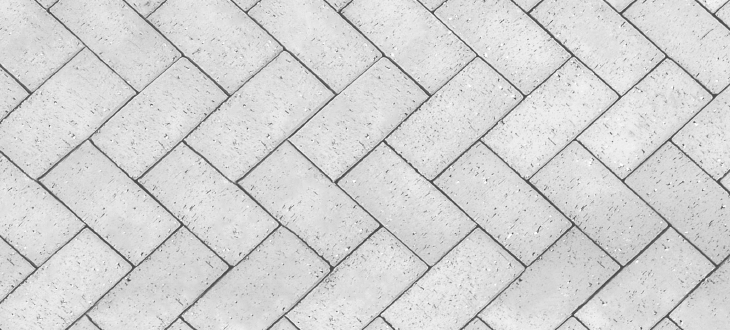
Herringbone: This design is highly popular due to its strength and interlocking capability, which provides excellent load distribution and durability. The zigzag pattern creates a dynamic look and can be laid at a 45-degree or 90-degree angle to the driveway.
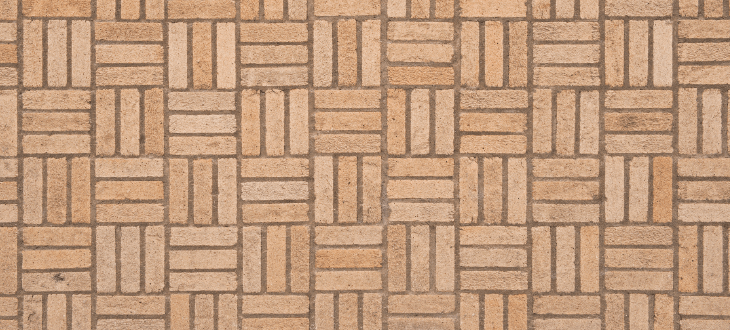
Basket weave: This design uses pairs of blocks to create a woven effect reminiscent of classic brick pathways. This pattern provides traditional charm to your block paving driveway. It is ideal for homes with a more conventional, rustic appeal.
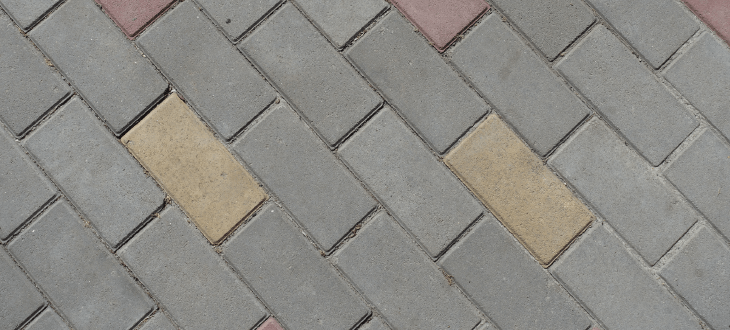
Stretcher bond: This pattern involves laying blocks in a linear, staggered formation. It achieves a neat, orderly appearance that suits modern homes well.
When choosing a block paving design, consider the architectural style of your home, the landscape, and your personal aesthetic preferences. Also, consider practical aspects like load-bearing capacity and maintenance requirements. Using high-quality materials and professional installation is crucial to ensure your driveway looks good and lasts long.
By carefully selecting a block paving design, you can create a block paving driveway that serves its functional purpose and significantly enhances your property's visual appeal and value.
How much does a block paved driveway cost?
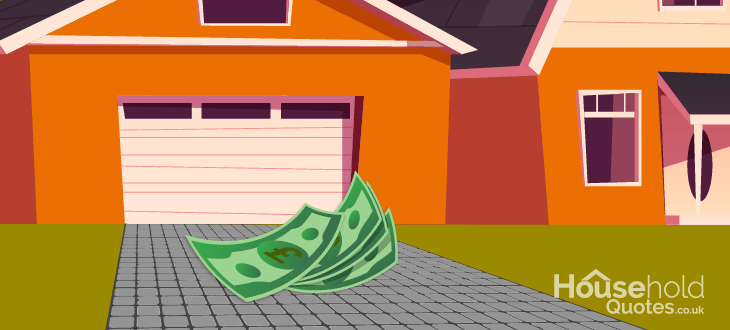
The average cost of a block-paved driveway is around £3,500 for a small one-car driveway of around 20m2. Block paving prices depend on the size of your driveway, the type of block you choose, the location of your home, and the level of experience the driveway specialist has.
The location of your home can significantly impact the cost of a block driveway. If your home is near where block pavers are manufactured, you'll incur lower transportation costs, leading to reduced prices. Conversely, homes in areas where block pavers aren't produced may face higher prices due to increased transportation costs.
Additionally, in areas with high demand for construction services, costs may be higher due to competition for contractors and resources. On the other hand, areas with many contractors may offer more competitive pricing. However, homes in cities such as London will have higher costs for driveway installation due to the higher cost of living compared to rural areas.
The size of your driveway will also significantly affect the cost of a block-paved driveway. Larger driveways take longer to install, resulting in higher labour costs. Additionally, if you opt for a design within your driveway, you should expect costs to increase.
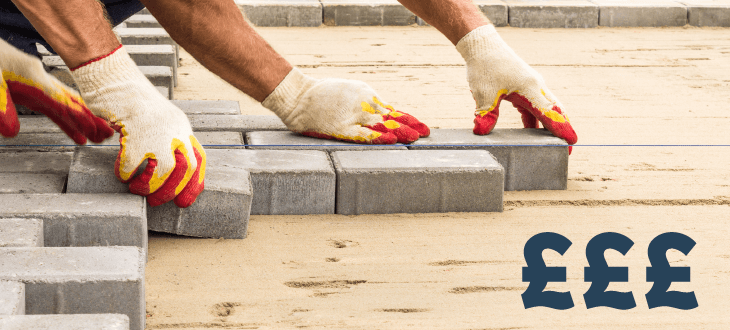
According to PriceYourJob, about 70% of the cost of block paving driveways is for labour. Driveway specialists charge a daily rate ranging from £150 to £200 per person. The more time spent installing a driveway, the higher the labour cost. Based on labour costs alone, block paving is more expensive than paving such as tarmac or poured concrete.
When looking into driveway specialists, it is important to hire ones with block paving experience. While it may be tempting to cut labour costs, poorly installed block-paving driveways can cause the material to shift and sink, leading to costly repairs.
Another factor that will affect block-paving driveway costs is the site preparation. Removing an old driveway, which includes waste removal, can cost between £1,500 and £2,000, whereas removing a front garden to transform it into a driveway can cost up to £1,000.
Driveway paving blocks: the cost per m2
The average cost of a paving block is about £100 per m2, as reported by Checkatrade. The cost of block paving driveways can vary based on several factors, including:
- Size of your driveway
- Type and quality of the block
- The region of purchase
The larger the area to be paved, the more material you need. Here are the average costs per driveway size based on the average block paving cost:
| Driveway size | Average cost |
|---|---|
| One car driveway (20m2) | £2,000 |
| Two car driveway (30m2) | £3,000 |
| Three car driveway (40m2) | £4,000 |
It's important to consider that the above costs cover materials only. You should also consider other expenses, such as labor and accessories. On average, expect to pay between £50 and £100 per m2 for labour costs for block paving driveways.
The type and quality of the materials have a significant impact on costs. Different types of materials vary in quality and grade. For example, in concrete pavers, premium-grade options generally have more intricate designs, better colour retention, and higher durability than standard-grade options. However, these high-quality pavers usually come with a higher price tag.
Additionally, your location affects labour rates, supply-demand dynamics, raw material availability, and shipping costs, all contributing to variations in material prices across regions.
Average cost of a driveway block
The average cost of block pavers can vary widely depending on several factors, including the type of material, quality, and the production process.
Generally, basic block concrete driveways might start at around £20 to £60 per m². Higher-end options like natural stone or custom-designed pavers can range from £50 to £125 or more per m².
The choice of material can significantly affect the overall driveway paving cost. Here are the available options, along with their average costs:
| Driveway material | Average cost per m2 |
|---|---|
| Concrete pavers | £20 to £60 |
| Clay/Brick pavers | £70 to £100 |
| Natural stone pavers | £50 to £108 |
| Permeable pavers | £60 to £90 |
| Composite pavers | £95 to £125 |
The most common choice for block paving driveways is concrete. It is the most affordable and considered one of the most durable options available.
However, UK standards do not consider concrete block pavers permeable, requiring the installation of a drainage system. This can add £1000 to the overall cost of a block paving driveway.
Permeable pavers, on the other hand, are more expensive. However, they allow water to drain through them sufficiently, which reduces the risk of flooding and can save you money on a drainage system.
Composite block pavers are made from recycled plastics, rubber, and other materials, often mixed with concrete or natural stone. These pavers offer a durable, eco-friendly alternative to traditional paving options such as concrete, brick, or natural stone. They are more expensive as a result of sourcing the recycled materials.
While concrete block pavers and brick pavers are the most common types of block available, there are others available from which you can choose. Considering these block types and their costs is important to decide which block is best for your home and your budget.
Marshalls driveway block paving or other installers?
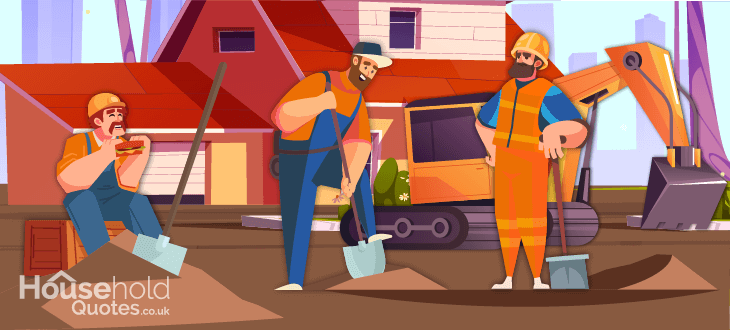
The average cost of block paving driveway installers is between £150 and £200 per day. The cost of driveway specialists depends on their expertise and accreditations. When looking for the best driveway installers, focusing on expertise over cost-effectiveness is essential.
Marshall registered installers often charge a higher cost of around £200 per day. The price difference is because of the following:
- Quality of materials: Marshalls is known for its high-quality, durable, and aesthetically pleasing materials. Their blocks often exceed industry standards, justifying the higher price.
- Installation standards: Marshalls Registered Installers must follow strict installation guidelines and best practices to maintain their certification, ensuring a high standard of workmanship.
- Warranty and guarantee: Marshalls offers comprehensive warranties on its products and installations, but this level of assurance often comes at a higher cost.
- Reputation and reliability: Marshalls has a long-standing reputation for reliability and excellence in paving.
- Professional training and certification: Marshalls Registered Installers undergo regular training and certification processes to stay updated on driveway installation techniques and standards. This commitment to continuous improvement can add to the overall cost but ensures top-tier quality and professionalism.
While generic block paving driveway installers can offer competitive pricing, the higher cost associated with Marshalls Registered Installers is often justified by the superior quality of materials, higher installation standards, comprehensive warranties, and professional reliability. You must weigh these factors to decide which option best suits your budget and long-term needs for your block paving driveway.
Can you DIY a block driveway?
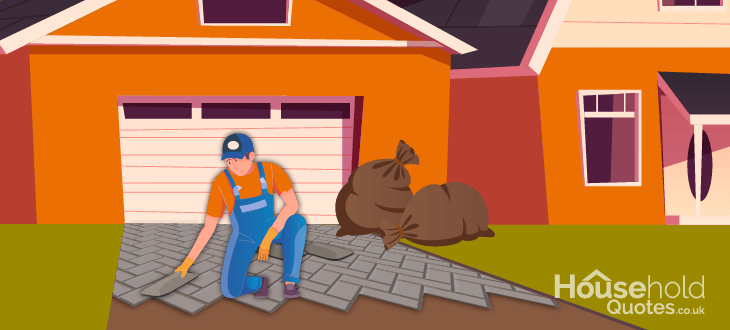
Creating a block driveway yourself is possible but requires careful planning, preparation, and the right tools and materials. Here is a step-by-step guide on how to DIY a block driveway:
- Mark out the driveway and excavate to a depth of around 150mm. Use a mini-digger if necessary, with rental costs typically between £200 to £300.
- Install edge restraints from plastic, metal, concrete, or timber to frame and hold the block paving driveway together.
- Fill the area with a sub-base made from gravel and crushed rock, which costs an average of £53 per 50mm of MOT type 1 sub-base.
- Add a weed barrier, which costs between £30 and £50 per square meter, to prevent weed growth and reduce maintenance.
- Add a 100mm deep layer of hardcore, which costs an average of around £300. It needs to be well compacted and flattened, for which you can hire a compactor for £20 to £50 per day.
- Next, add a 50mm thick layer of damp, sharp sand, which costs an average of around £250.
- Lay the blocks in your desired design on the driveway.
- Once the blocks are laid, brush in kiln-dried sand between the joints, which costs, on average, around £250.
Opting for a DIY block paving driveway can reduce costs but requires time, effort, and some specialised tools. If you choose the DIY route, you must purchase all the materials
Mistakes at any stage of the process can result in uneven surfaces, poor drainage, or shifting blocks, so thorough research and seeking advice from professionals can be beneficial.
Hiring a driveway specialist is essential to prevent mistakes from occurring. Household Quotes can help you connect with trusted local driveway specialists. Fill out our 30-second form, and we will provide you with four free non-binding quotes from the best driveway specialists in your area.
- Describe your needs
- Get free quotes
- Choose the best offer
It only takes 30 seconds

Block paving for driveways: pros and cons
Block paving for driveways has its own set of advantages and disadvantages that homeowners should take into consideration:
- Aesthetic appeal: Block paving comes in various colours, shapes, and patterns, allowing for customisation to match the style of the home and enhance curb appeal.
- Durability: When properly installed, block paving is highly durable and can withstand heavy loads and frequent use, making it suitable for driveways.
- Maintenance: If damaged, individual blocks can be easily replaced without affecting the rest of the driveway. This makes maintenance simpler and often more cost-effective.
- Permeability: Many block paving options allow water to drain through the gaps between the blocks, reducing surface runoff and improving drainage.
- Flexibility: Block paving is flexible, meaning it can adapt to minor ground movements without cracking, a common issue with concrete slabs.
- Easy to repair: When a block paver becomes damaged or stained, it can be easily lifted and replaced. Only the damaged pavers need to be addressed. The repair process causes minimal disruption to the overall driveway. Large demolition or extensive construction work is unnecessary, making the repair process quick and efficient.
- Cost: Block paving can be more expensive upfront than other driveway materials like gravel or asphalt, particularly for high-end materials like natural stone.
- Installation: Proper installation requires high skill and can be time-consuming. Poor installation can lead to issues like uneven surfaces and poor drainage.
- Maintenance: While individual blocks are easy to replace, block paving can be susceptible to joint weed growth and may require regular cleaning and re-sanding.
- Colour fading: Over time, exposure to sunlight and weather can cause the colours of the blocks to fade, affecting the driveway’s appearance.
- Weed and moss growth: The gaps between the blocks can attract weeds and moss, necessitating regular upkeep to keep the driveway clean and well-maintained.
Considering these pros and cons can help you decide if block paving is right for their driveway, balancing aesthetic desires with practical considerations.
- Describe your needs
- Get free quotes
- Choose the best offer
It only takes 30 seconds

FAQ
The average cost of a block paving driveway is around £3,500 for a single-car driveway of approximately 20m2. Factors such as the size of your driveway, your location, the quality and type of block chosen, and the experience of the driveway installer will affect the price.
The disadvantages of block paving driveways include their higher cost than other driveway materials such as gravel or asphalt. The installation process can be challenging and time-consuming, increasing labour costs. They are susceptible to weed growth, requiring more maintenance without a weed barrier. Additionally, block paving driveways are prone to fading over time.
Block paving is more expensive than regular paving because it involves installing blocks instead of pouring concrete, tarmac, or gravel. As a result, the labour costs are higher for block paving than regular paving
Yes, you can pave your driveway. However, working alongside at least one driveway installer is recommended, as poorly installed block paving driveways can result in sinking and shifting of the material, which can lead to costly repairs.

Caoimhe is an experienced content writer and researcher who is passionate about providing accessible information to every reader. With a background in English literature and Sociology, she combines the two disciplines to create cohesive, well-thought-out, and well-informed pieces.
